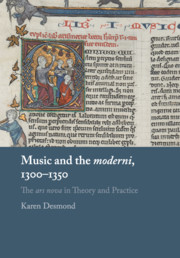Book contents
- Music and the moderni, 1300–1350
- Music and the moderni, 1300–1350
- Copyright page
- Dedication
- Contents
- Figures
- Tables
- Musical Examples
- Acknowledgements
- Note on Music Examples
- Manuscript Sigla
- Abbreviations
- Abbreviations for Anonymous Music Treatises
- 1 Introduction
- 2 Subtilitas and the ars nova
- 3 Jean des Murs, Quadrivial Scientist
- 4 Arts Old and New
- 5 From Trees to Degrees
- 6 Notational Dots and the Line of Musical Time
- Epilogue
- Book part
- Bibliography
- Index of Compositions
- General Index
2 - Subtilitas and the ars nova
Published online by Cambridge University Press: 01 September 2018
- Music and the moderni, 1300–1350
- Music and the moderni, 1300–1350
- Copyright page
- Dedication
- Contents
- Figures
- Tables
- Musical Examples
- Acknowledgements
- Note on Music Examples
- Manuscript Sigla
- Abbreviations
- Abbreviations for Anonymous Music Treatises
- 1 Introduction
- 2 Subtilitas and the ars nova
- 3 Jean des Murs, Quadrivial Scientist
- 4 Arts Old and New
- 5 From Trees to Degrees
- 6 Notational Dots and the Line of Musical Time
- Epilogue
- Book part
- Bibliography
- Index of Compositions
- General Index
Summary
- Type
- Chapter
- Information
- Music and the moderni, 1300–1350The a<I>rs nova </I>in Theory and Practice, pp. 35 - 69Publisher: Cambridge University PressPrint publication year: 2018



